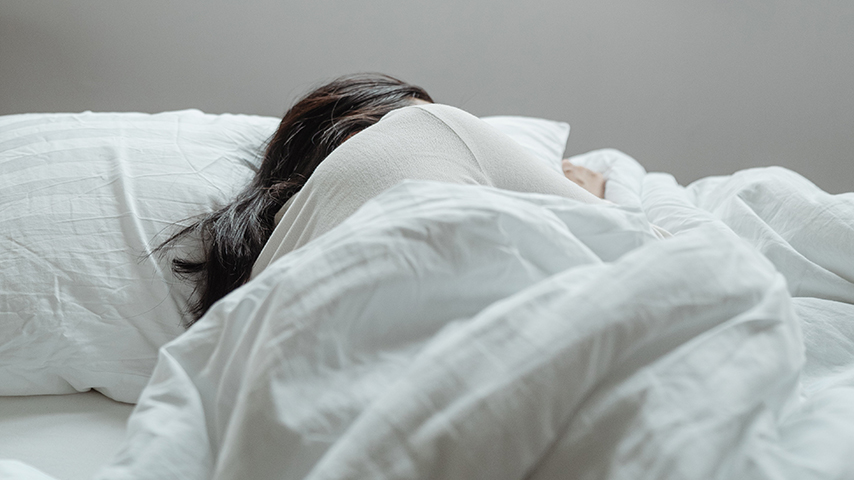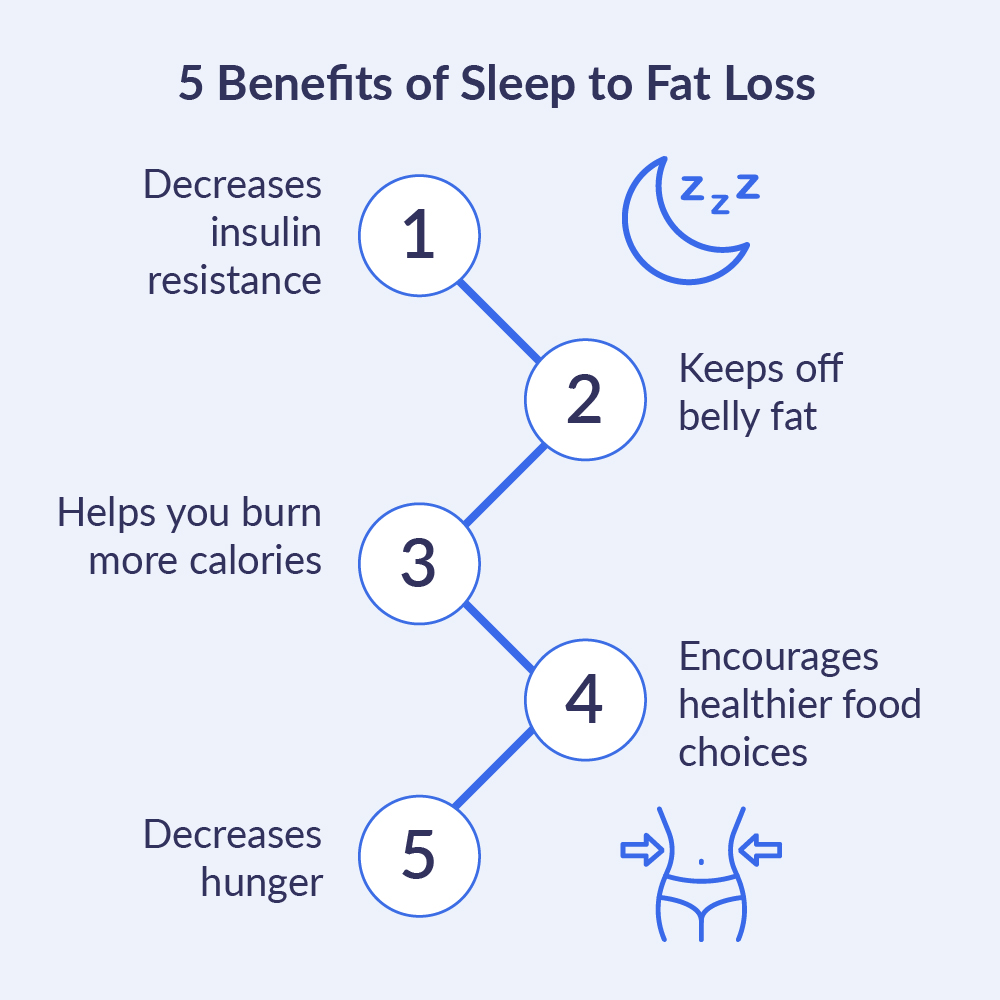
Heads up! This article is connected to our Fat Loss Journey page. For the complete picture on how to lose fat using our evidence-based system, check it out here!
Getting optimal sleep is just as important as training or nutrition when it comes to fat loss loss, perhaps even more important!
In this article, we’ll break down how to get a perfect night’s rest, and explain 5 reasons why sleep is critical for fat loss, all supported by evidence based research.
By the end of this article, it should be clear to you why you should prioritize your sleep schedule if you are serious about losing as much fat as possible.
Table of Contents
How to Get a Perfect Night’s Rest

First, we’ll tell you exactly how to get optimal sleep, night after night. We break it all down in more detail in our Basics of Sleep article, but we’ll quickly summarize what you need to know here:
- Get roughly 8 hours of sleep a night. You may need a bit more or a bit less, but the goal should be to be able to wake up without an alarm and not feel drowsy at any point during the day.
- Go to bed at the same time every night. Your sleep will be higher quality if you are asleep at the same time every night.
- Make sure your sleep is uninterrupted! Continuous sleep is the best kind of sleep, and ensures your body gets the most out of it’s time to recover.
Following these simple rules should allow you to burn as much fat as possible.
How Sleep Boosts Fat Loss
So how exactly does sleep boost fat loss? We’ll walk you through 5 reasons in this section, all backed by evidence-based research.

More sleep, more fat loss
Studies have shown sleep deprivation results in higher insulin resistance. When insulin resistance goes up, you are less able to burn fat.
Plain and simple, when all other variables remain the same, those who get more sleep lose more fat!
Sleep keeps off belly fat
Hoping to cut down that belly fat and achieve that shredded 6-pack you've always wanted? Prioritizing sleep may be your best bet!
Studies show that sleep deprived individuals have an increased tendency to store fat, especially in their abdomen.
In other words, get more sleep, do fewer crunches, and you'll get better abs – is there a sweeter deal than that?
Sleep helps you burn more energy
If you've read our foundational nutrition post on energy balance, you know weight loss all boils down to one thing: expending more energy than you take in.
So when you're attempting to lose fat, the more energy you can burn, the better! Research suggests that individuals who sleep more tend to burn more energy through movement and exercise, leading to greater fat loss.
So by sleeping more, you're automatically one step closer to shredding and slimming.
Sleep leads to healthier food choices
When trying to slim down, it's often not just about eating less food, but also eating the right foods.
Studies show sleep deprivation is directly correlated to increased consumption of foods with higher energy density, leading to excessive caloric intake and weight gain. Without proper rest, those junk food cravings become stronger than ever and more difficult to resist.
Why make it harder to keep to your nutritional plan? Hit the hay, and kick those cravings to the curb!
Replace hunger with more sleep
Studies have shown sleep deprivation causes a decreased production of leptin ("the fullness hormone") and an increase of ghrelin production ("the hunger hormone").
This translates to feeling more hungry more often, increased consumption, and weight gain. As you very well know, hunger is one of the biggest enemies of sticking to a nutrition plan.
If you feel as if those hunger pangs are getting to you, try supplementing your diet with more sleep! The more sleep you get, the less susceptible you will be to increased hunger.
Conclusion
That wraps up our guide for why sleep is critical for fat loss! We covered:
- Sleep boosts your insulin response, which increases your body’s ability to lose fat.
- Well rested individuals have been proven to keep off belly fat more effectively than those who are sleep deprived.
- Sleep helps you burn more energy, which is critical for losing fat.
- Sleep makes it easier to eat healthy and make good nutritional choices.
- Sleep boosts leptin, which is the hormone responsible for making you feel “full”. This makes dieting for fat loss much easier.
- A consistent sleep schedule that provides around 8 hours of uninterrupted sleep is all you need to get all of sleep’s benefits concerning fat loss.
Knowing all of this, you should have plenty of reasons to prioritize getting a good night’s rest. If you want to reach your fat loss goal as quickly and painlessly as possible, sleep is a critical component!
For the next step in your fat loss journey, be sure to visit our Fat Loss Journey page!
References and Useful Research
- Broussard JL, Ehrmann DA, Van cauter E, Tasali E, Brady MJ. Impaired insulin signaling in human adipocytes after experimental sleep restriction: a randomized, crossover study. Ann Intern Med. 2012;157(8):549-57. Link
- Nedeltcheva AV, Kilkus JM, Imperial J, Schoeller DA, Penev PD. Insufficient sleep undermines dietary efforts to reduce adiposity. Ann Intern Med. 2010;153(7):435-41. Link
- St-onge MP, Shechter A. Sleep disturbances, body fat distribution, food intake and/or energy expenditure: pathophysiological aspects. Horm Mol Biol Clin Investig. 2014;17(1):29-37 Link
- Wang X, Sparks JR, Bowyer KP, Youngstedt SD. Influence of sleep restriction on weight loss outcomes associated with caloric restriction. Sleep. 2018;41(5) Link
- Chaput JP, Després JP, Bouchard C, Tremblay A. Longer sleep duration associates with lower adiposity gain in adult short sleepers. Int J Obes (Lond). 2012;36:752–6. Link
- Chaput JP, Després JP, Bouchard C, Tremblay A. Short sleep duration preferentially increases abdominal adiposity in adults: preliminary evidence. Clin Obes. 2011;1(4-6):141-6. Link
- Gangwisch JE, Malaspina D, Boden-albala B, Heymsfield SB. Inadequate sleep as a risk factor for obesity: analyses of the NHANES I. Sleep. 2005;28(10):1289-96. Link
- Beccuti G, Pannain S. Sleep and obesity. Curr Opin Clin Nutr Metab Care. 2011;14(4):402-12. Link
- Al khatib HK, Harding SV, Darzi J, Pot GK. The effects of partial sleep deprivation on energy balance: a systematic review and meta-analysis. Eur J Clin Nutr. 2017;71(5):614-624. Link
- Nedeltcheva AV, Kilkus JM, Imperial J, Kasza K, Schoeller DA, Penev PD. Sleep curtailment is accompanied by increased intake of calories from snacks. Am J Clin Nutr. 2009;89(1):126-33 Link
- Markwald RR, Melanson EL, Smith MR, et al. Impact of insufficient sleep on total daily energy expenditure, food intake, and weight gain. Proc Natl Acad Sci USA. 2013;110(14):5695-700. Link
- Greer SM, Goldstein AN, Walker MP. The impact of sleep deprivation on food desire in the human brain. Nat Commun. 2013;4:2259. Link
- Hanlon EC, Tasali E, Leproult R, et al. Sleep Restriction Enhances the Daily Rhythm of Circulating Levels of Endocannabinoid 2-Arachidonoylglycerol. Sleep. 2016;39(3):653-64. Link
- Chaput, JP. & Tremblay, A. Curr Obes Rep (2012) 1: 245. https://doi.org/10.1007/s13679-012-0026-7 Link
- Institute of Medicine (IOM) Committee on Sleep Medicine and Research, Colten HR and Altevogt BM (ed.), Sleep Disorders and Sleep Deprivation: An Unmet Public Health Problem, Washington, DC: National Academy of Sciences,2006. Link
- Leproult R, Van cauter E. Role of sleep and sleep loss in hormonal release and metabolism. Endocr Dev. 2010;17:11-21 Link